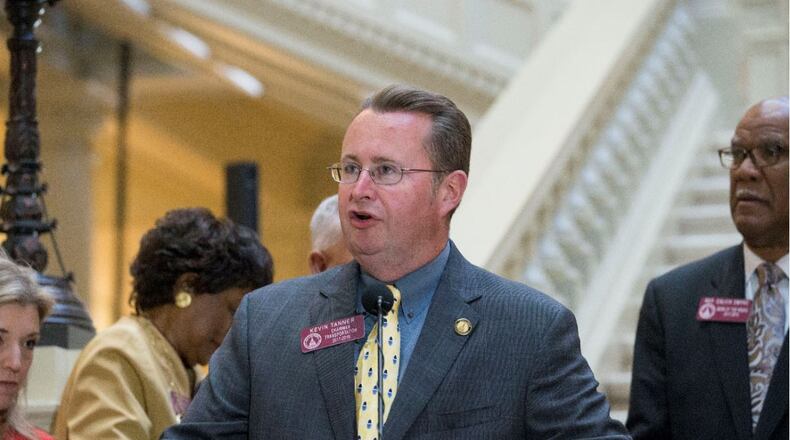A bill introduced in the General Assembly on Wednesday would provide tens of millions of dollars a year for mass transit — a substantial investment for a state that for decades has been reluctant to fully embrace public transportation.
The money would come from a 50-cent fee on all taxi, limousine and ride-hailing trips and a 25-cent fee for shared rides. That would generate an estimated $30 million to $60 million annually for transit.
Some of the money would support new subsidies for unemployed rural residents who need transportation to get jobs or to get to school and tax credits for companies that help cover their employees’ transportation costs. But some of the money could be available for metro Atlanta programs.
The proposed transit investment would be a drop in the bucket compared with MARTA’s $981.5 million annual budget. But it would give transit supporters something they have long sought: a dedicated source of state funding for public transportation. And its passage would be the latest sign that Georgia’s political leaders now see transit as a key to the state’s development.
"Nothing has ever been done like this before," said state Rep. Kevin Tanner, R-Dawsonville, the bill's sponsor. "This is actually boots on the ground, removing obstacles (workers) face, trying to make their lives better."
Tanner and other lawmakers made a big splash last year with a new law that could pave the way for transit expansion in 13 metro Atlanta counties. That law has already sparked next month's Gwinnett County referendum on joining MARTA. Cobb, DeKalb and Fulton counties also are pursuing transit expansions.
Now Tanner wants to jump-start transit in the rest of the state and provide a dedicated source of state funding.
House Bill 511 would replace Georgia’s state sales tax on rides for hire with the flat fee to be collected beginning in January. In addition to providing money for transit, the fee would address a long-standing dispute over how such companies are taxed.
Currently, taxi and limo companies pay the sales tax, but ride-hailing firms such as Uber and Lyft have maintained they're not required to pay it under state law (the Department of Revenue disagrees). If HB 511 passes, all companies would pay the flat fee.
The money would provide a big boost to state transit spending. A 2017 analysis found Georgia spends about $14.5 million annually on transit — most of it on the state's Xpress bus service in metro Atlanta. Georgia ranks 37th among the states in transit spending per capita and 45th in spending per trip, according to the Atlanta Regional Commission.
But Georgia officials have warmed to transit as a way to address traffic congestion and support economic development. In 2015, they set aside $75 million for one-time grants for transit capital projects. And last year they approved $100 million for bus rapid transit facilities on Ga. 400.
Under HB 511, the new fee would be used to pay for three-year competitive pilot projects to encourage private-sector transit investments and to decrease unemployment. The money would pay for tax credits for employers and other private firms that provide workers with ways — such as vanpools — to get to their jobs.
Other programs would directly subsidize unemployed residents who need transportation to work or school, using vouchers or credits. Those programs would target 22 economically distressed counties in Middle and South Georgia.
To oversee those programs, Tanner’s bill would consolidate state transit spending in a single new agency — the Georgia Department of Mobility and Innovation. Six agencies currently oversee various aspects of transit funding.
The bill would eliminate the Georgia Regional Transportation Authority and place two other agencies — the State Road and Tollway Authority and the newly created Atlanta-Region Transit Link Authority — under the new agency.
The idea, Tanner said, is to streamline the state’s bureaucracy while creating a single agency responsible for improving transit access across Georgia.
The bill also would divide the state outside metro Atlanta into eight “mobility zones” for transit planning and funding purposes. Those zones would be similar to the 13-county ATL Board region created by last year’s bill.
The bill appears to have bipartisan support. State Rep. Calvin Smyre, D-Columbus, a co-sponsor, said it addresses transportation, workforce development and economic concerns that have sometimes taken a back seat to other issues at the Capitol.
“I have lived to see transit and transportation come back to its proper place in the state of Georgia,” Smyre said.
Stay on top of what’s happening in Georgia government and politics at ajc.com/news/georgia-government/.
About the Author
Keep Reading
The Latest
Featured




